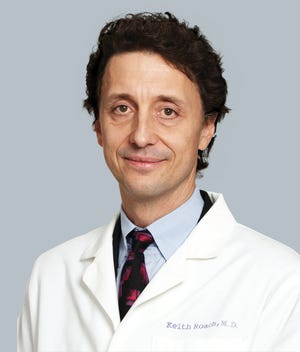Dr. Roach: Rheumatoid arthritis can be treated with a variety of medications
Dear Dr. Roach: Why doesn’t rheumatoid arthritis have any medicines to help treat it?
— S.S.K.
Dear S.S.K.: Rheumatoid arthritis is relatively common (as much as 1% of the population, with women twice as likely to be affected than men), but it’s a much less common form of arthritis than osteoarthritis, which affects as much as 40% to 50% of an older population. However, rheumatoid arthritis is much more feared because it can be destructive to the joints. It can also affect other parts of the body besides the joints, especially the heart, lungs, blood vessels and skin.
When I underwent training, I saw many patients with terrible deformities of their hands, but that is much less common now because there are many new and effective treatments for rheumatoid arthritis. It’s important for primary care doctors like me to recognize rheumatoid arthritis early and get our patients to the experts (rheumatologists) as quickly as possible to begin treatment before permanent damage to the joints occurs. Blood testing and X-rays usually confirm the diagnosis.

The typical symptoms of rheumatoid arthritis begin slowly, with joint pain and stiffness, especially in the morning, that might be mistaken for the more-common osteoarthritis. However, the pain from rheumatoid arthritis in the morning, or after a prolonged period of not moving, lasts much longer (usually over an hour) than osteoarthritis (usually under half an hour). The pain and stiffness are usually the same on one side as the other, and there is more likely to be warmth in the joints during an exam. Smaller joints, such as those in the fingers and wrists, are usually the earliest affected. These symptoms shouldn’t be ignored.
Early use of drugs to get RA under control (these are often called DMARDs, disease-modifying antirheumatic drugs) has become the standard of care. Methotrexate is probably the most common drug rheumatologists initially prescribe, but hydroxychloroquine is also frequently used.
Anti-inflammatory drugs, including NSAIDs like ibuprofen as well as steroids like prednisone, are often used at first to get symptoms under control while the DMARDs start working, which may take weeks or months. Once the disease is under control, prednisone-type drugs are stopped entirely or reduced as much as possible to avoid the many long-term adverse effects of these drugs.
There are a wide range of biological therapies that are used in people who do not respond to this treatment. Many of these drugs, whose generic names end in “-mab,” are monoclonal antibodies working against certain cellular triggers for rheumatoid arthritis, such as tumor necrosis factor, interleukin-6, CD-20 on antibody-producing cells, and many others.
Other synthetic DMARDs work against the Janus kinase enzyme. These drugs end in “-nib.” The treatment of RA is so complex and changes so quickly that an expert who does this every day is by far the best choice when available.
Because RA can affect other organs, other specialists and treatments are sometimes necessary. For primary care doctors, it’s important to recognize that the chronic inflammation of RA predisposes patients to developing heart disease and stroke at a much greater frequency than expected from their blood pressure and cholesterol levels. Early and aggressive use of treatments to reduce heart attack and stroke risk is appropriate.
Readers may email questions to ToYourGoodHealth@med.cornell.edu.